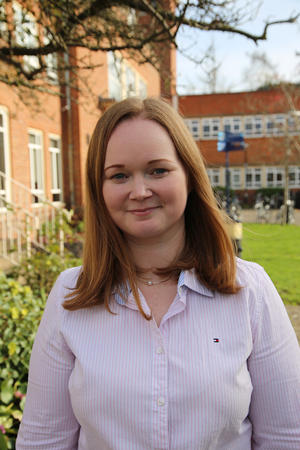Dr Jennifer Joyce

Course Leader and Senior Lecturer in Sport and Exercise Science
School of Sport and Exercise Science
Academics
email: j.joyce@worc.ac.uk
tel: 01905 542632
Dr Jennifer Joyce is the course leader for the Sport and Exercise Science course and her passion lies in nurturing the talents and aspirations of her students to ensure they reach their full potential. She is deeply committed to supporting students in their personal and professional growth and enjoys supporting students to develop the resilience needed to succeed in their academic journey.
Originally from Ireland, Jennifer joined the University of Worcester in September 2013. Jennifer graduated from the University of Limerick, Ireland in 2007 with a BSc in Sport and Exercise Sciences before continuing her studies at the University of Chichester, UK where she received an MSc in Sport and Exercise Psychology. Having developed an interest in the relationship between exercise and cognitive function during her time at both of these institutes, Jennifer completed a PhD examining the effects of exercise on cognitive function in older adults. Her current research interests include “active ageing” and the impact of menopause on cognitive function and brain health.
More recently Jennifer’s work has focused on enhancing the employability pathway on the sport and exercise science course to ensure graduates are suitably prepared to work effectively in industry. She strives to empower students by equipping them with essential employability skills to excel in their chosen careers and has a genuine enthusiasm for student success.
Qualifications
- Senior Fellow of Higher Education Academy (SFHEA) (2023)
- PGCert in Learning and Teaching in Higher Education, University of Worcester (2015)
- PhD Cognitive Neuroscience, Exercise and Ageing, University of Limerick, Ireland (2013)
- MSc - Sport and Exercise Psychology, University of Chichester, UK (2008)
- BSc - Sport and Exercise Sciences, University of Limerick, Ireland (2007)
-
Internal Awards
- University of Worcester Leading Teaching Award (2023)
- University of Worcester Teaching Team Award (2023)
- University of Worcester Teaching Award (2016)
Teaching & Research
Teaching
Jennifer has responsibility for teaching on the employability pathway in Sport and Exercise Science and leads the work placement module for final year students where she enjoys supporting students to develop interpersonal skills and enhance their preparedness for working in industry.
In addition to this, Jennifer also teaches in the area of motor learning and skill acquisition and uses her current research interests to underpin her teaching in the area of exercise and ageing.
Primary Teaching Responsibilities:
- Motor Learning and Skill Acquisition
- Exercise and Ageing
- Employability skills for Sport and Exercise Scientists
Research Interests:
Jennifer’s research area explores the relationship between ageing, exercise and cognitive functioning and more recently is focusing on the impact of menopause (and the associated decline in oestrogen) on cognitive function and brain health.
Jennifer also has an interest in the psycho-social processes that influence physical activity (dis)engagement in older adults and exploration of the mechanisms that lead to physical (in)activity to better promote healthy ageing.
Professional Bodies
- European menopause and andropause society (EMAS)
- International Menopause Society (IMS)
- International council on active aging (ICAA)
- Advance HE
Publications
Rhoden, C.L., and Joyce, J. (2023) Positive Affectivity Influences Subjective Age and Daily Moving in Older Adults, Physical Activity and Health, 7(1), pp. 255–269. DOI: https://doi.org/10.5334/paah.266
Cook, M.D., Sandu, A.K. and Joyce, J.P. (2020) Effect of New Zealand Blackcurrant on blood pressure, cognitive function and functional performance in older adults. Journal of Nutrition in Gerontology and Geriatrics, https://doi.org/10.1080/21551197.2019.1707740
Joyce, J., Smyth, P.J., Donnelly, A. and Davranche, K. (2014) The Simon task and aging: Does acute moderate exercise influence cognitive control? Medicine and Science in Sports and Exercise, 46(3), 630-639
Joyce, J., Graydon, J., McMorris, T. and Davranche, K. (2009) The time course effect of moderate intensity exercise on response execution and response inhibition. Brain and Cognition, 71(1), 14-19.